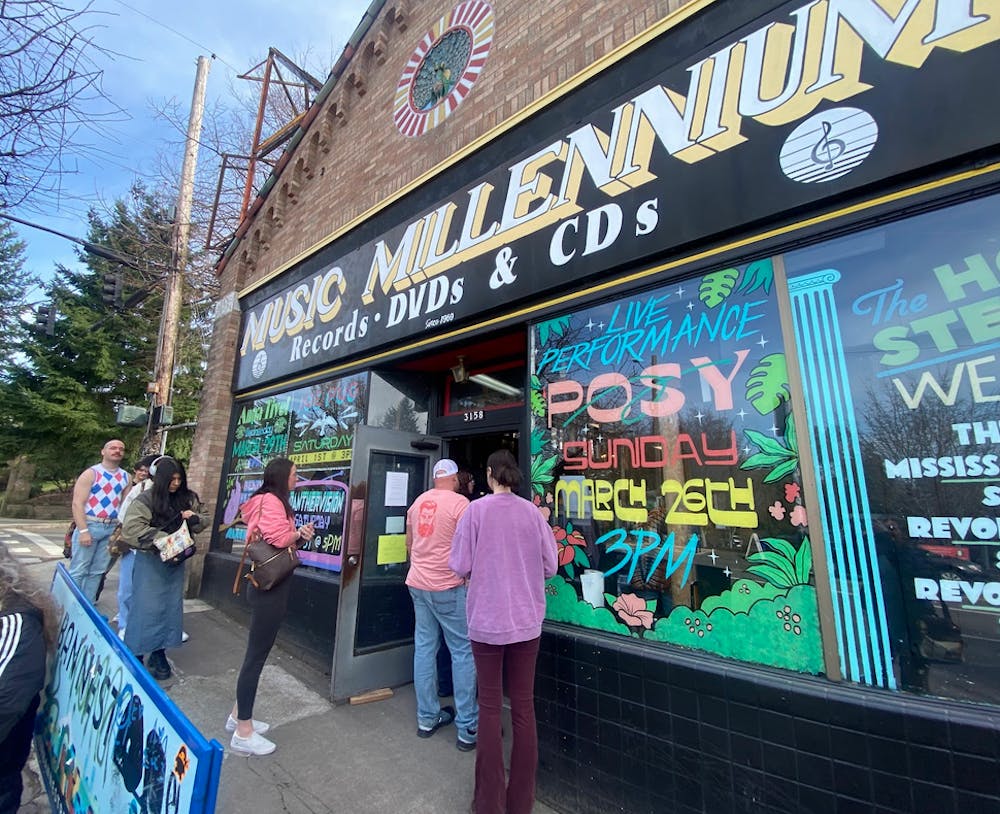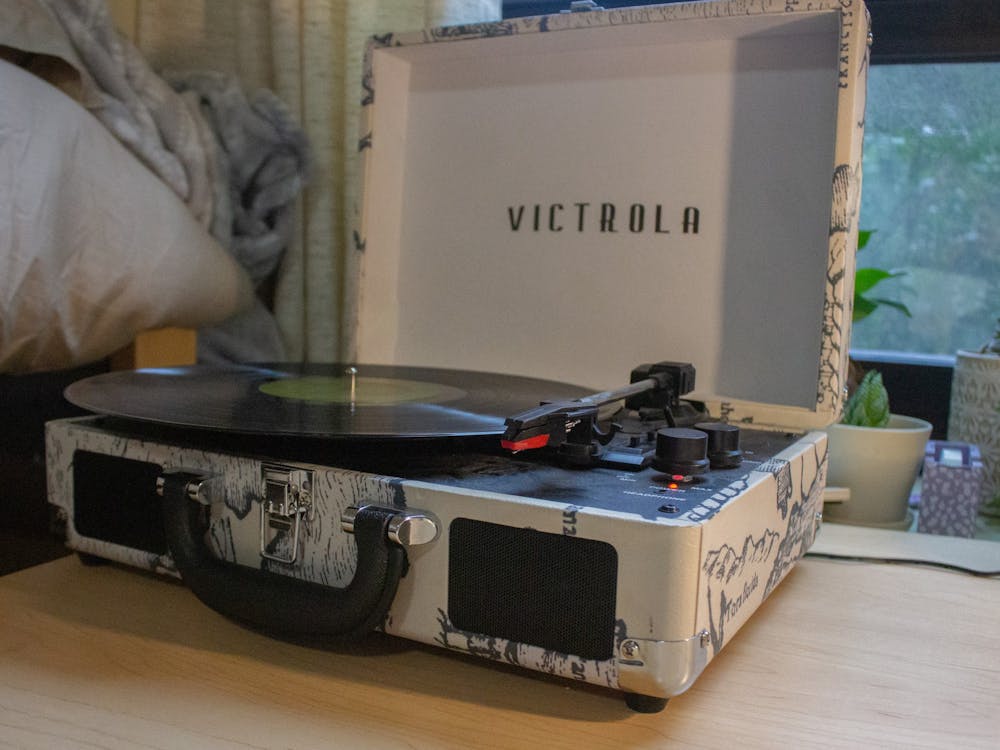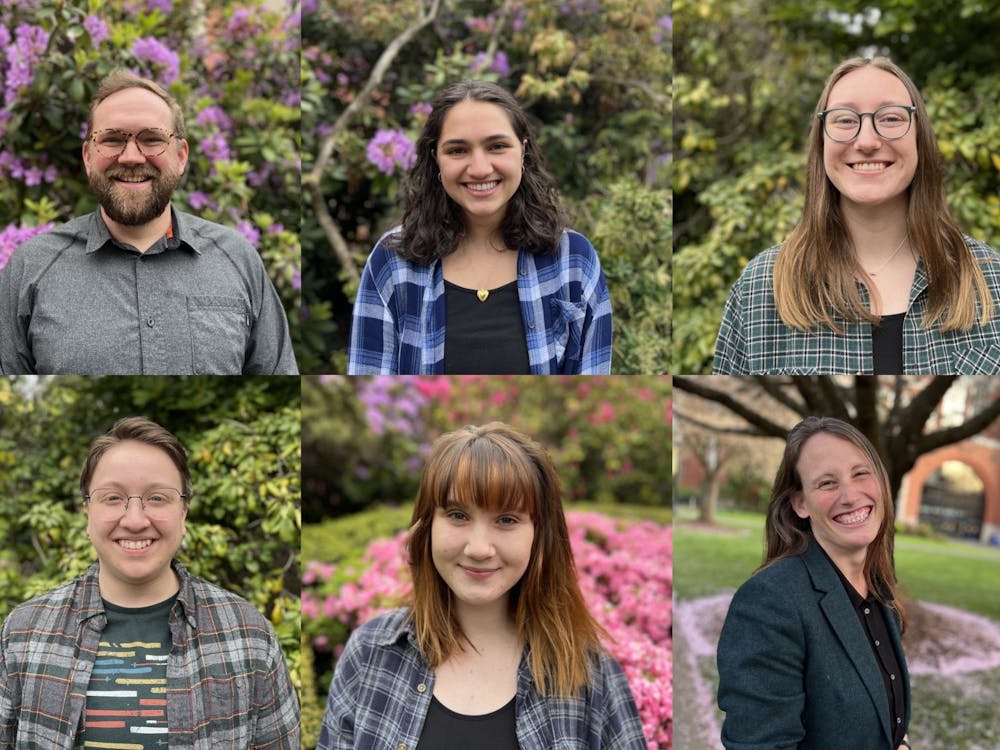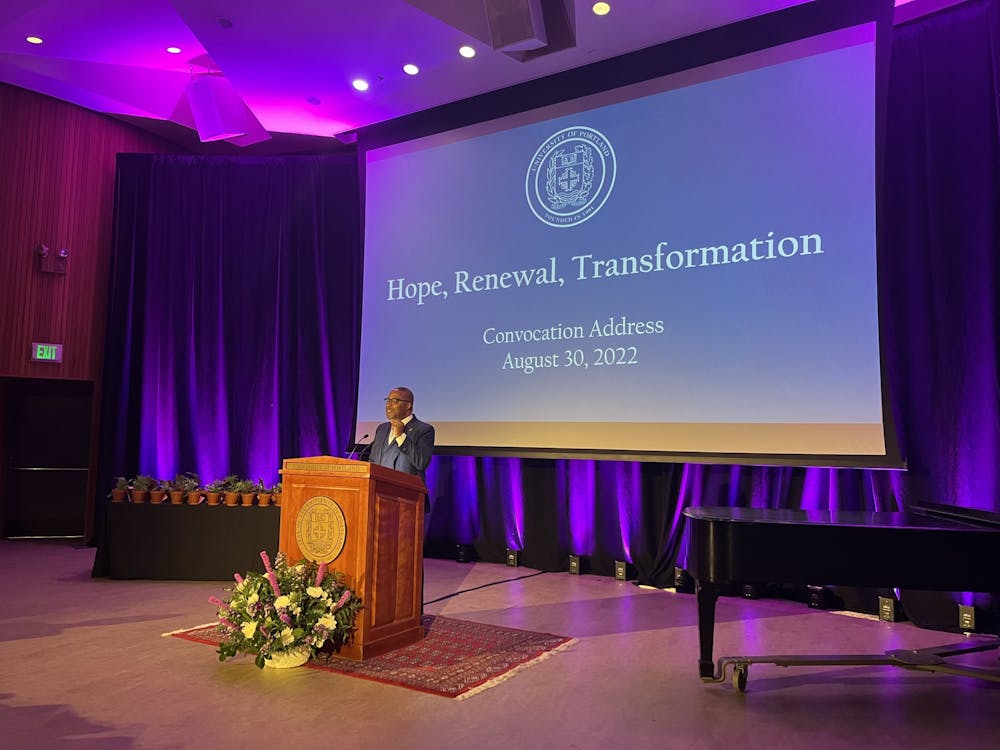“There really is a tunnel under ocean blvd.” The man working at the record store assured me of this as he handed me my free poster and we shared a quick laugh together. It felt good to hear that.
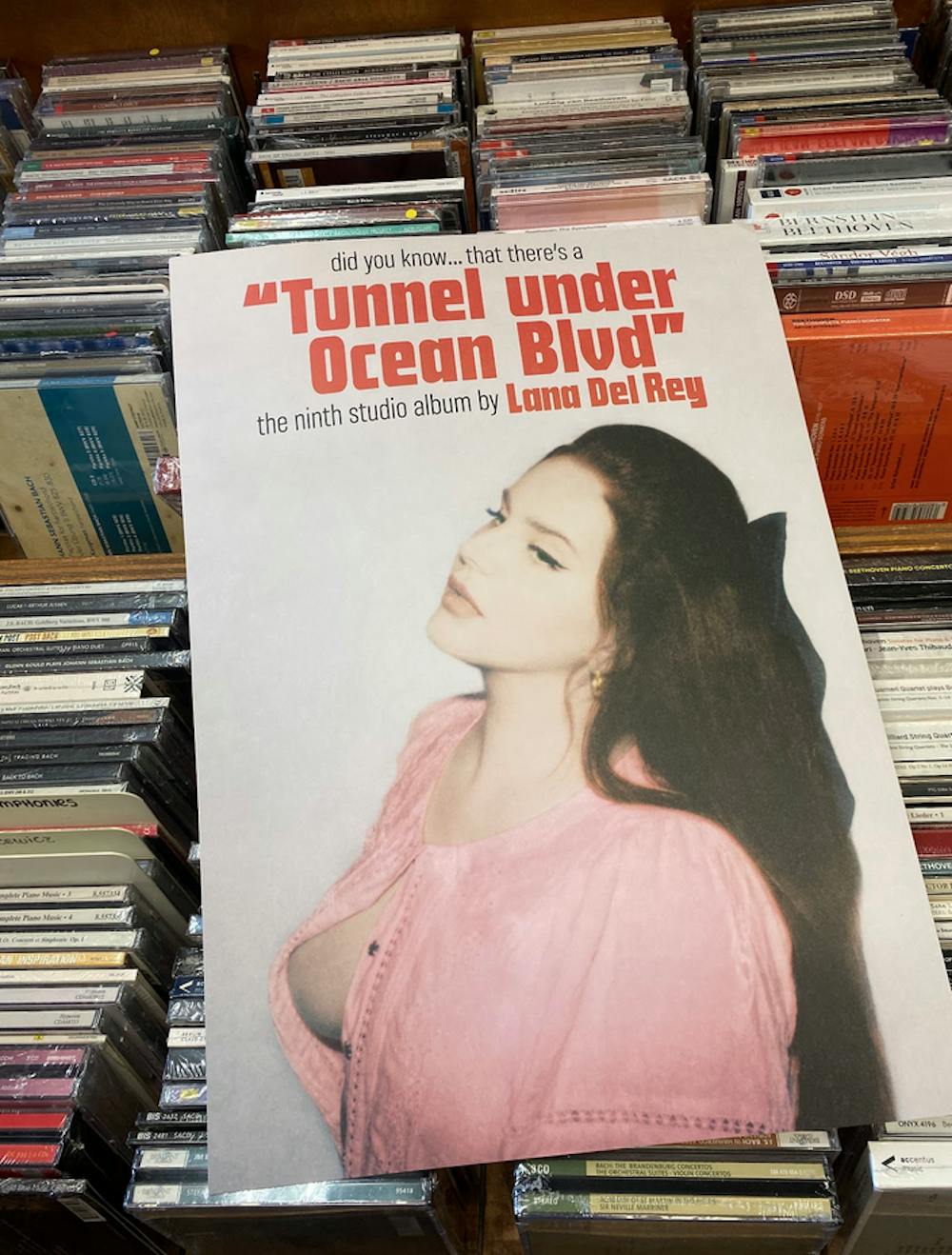
When Lana Del Rey announced that she would have pre-release listening parties on March 22 (two days before the official release on March 24,) at various locations around the world for her new album, “Did you know that there is a tunnel under ocean blvd.,” I immediately checked to find the closest one. Sure enough, Portland had a listening party scheduled at Music Millennium, a record store in the Laurelhurst neighborhood. I knew I had to go.
After waiting in line to get in, my friend and I perused the aisles, biding time until 4 p.m. when the album would start playing. I was too excited to actually focus on record shopping, which was unfortunate because looking back at photos, I can see Lou Reed’s “New York” on the display wall, and man, I have been looking for that one. Anyway, that’s not so important here.
Del Rey was the real star of the day (And Lou Reed is nothing but a name drop in “Brooklyn Baby”). The store was clearly prepared for the influx of fans, with an altar of her previous albums arranged by the entrance.
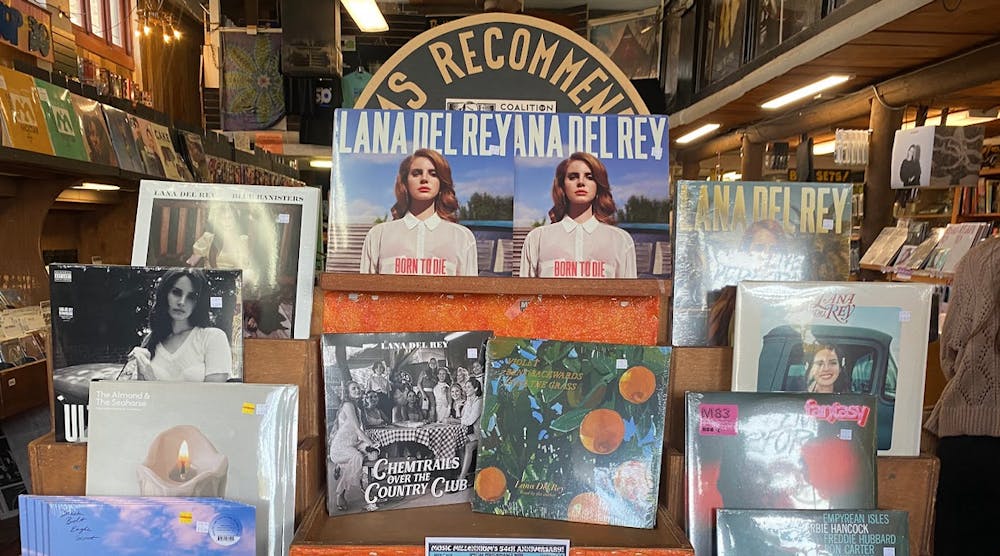
The music began to play after the long line of people outside, sporting Lana Del Rey concert t-shirts, heart-shaped sunglasses and other iconography of the artist, slowly filled the record store.
Then it stopped. Then it started again. Then it stopped.
They were having trouble with the streaming link, so there was about half an hour of choppy music, as they continually restarted the album. I definitely got my fair share of the opening song, “The Grants.” Don’t get me wrong though, I love that song and even with the choppy pauses it still gave me goosebumps.
You could tell people were getting antsy to hear the album, and I sensed some frustration in the room. I couldn’t help but smile a little while looking at everyone anxiously standing around — myself included — because as much as some people may have wanted to leave, no one was going to, not now. After waiting months for the album, we all just had to muster 30 more minutes of patience.
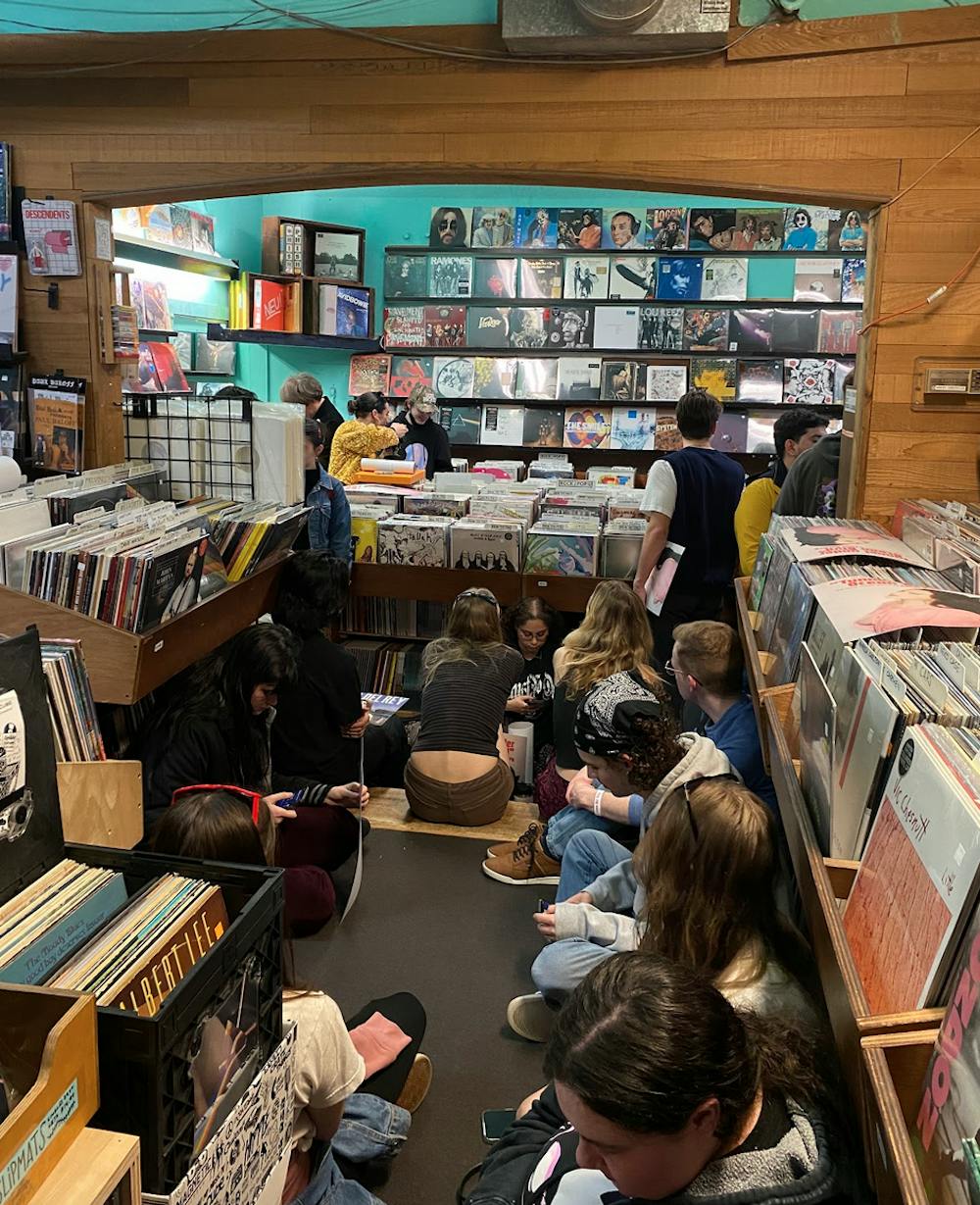
When the music started playing smoothly, no disruptions, a new attitude took over the store. The energy became relaxed, focused and then contemplative. The familiar first two tracks, “The Grants” (released on March 14) and “Did you know that there is a tunnel under ocean blvd.” (released Dec. 7, 2022), were like a warmup, giving me time to get comfortable and preparing me for whatever was coming next.
I ended up standing, then later leaning, on the corner record shelf for two hours, riding the sound waves and sharing an occasional surprised look with the other listeners crowded around me.
Becoming absorbed by the music, I tried to make sense of the lyrics, the imagery braiding between songs and shifting musical styles. As expected, the album was emotionally captivating, and I knew it would take way more than one listen to process it.
It would be impossible for me to pick a favorite song after my first listen (in fact, I still don’t have one even now). However, I will admit I couldn’t stop thinking about “Paris, Texas” at dinner that night.
I had to hear it all again — but I also had to wait another day.
Soon enough it was 9 p.m. on March 22 (pros of being on the west coast), so I spent that Thursday night laying in my room staring at the shadow of light that my lampshade made on the ceiling while “Ocean Blvd” played on my speaker from beginning to end.
Compared to her recent releases “Blue Banisters” and “Chemtrails Over the Country Club,” this album has an intense dark side. She doesn’t turn away from death and discomfort, but she also doesn’t get stuck in them. Moving back and forth between the light and dark sides of life, we see a full-range expression of both. Another notable feature is that her lyrics seem to be more personally revealing in this album than ever before.
Since the beginning of her career, Del Rey has dealt with criticism for adopting “over the top personas” and not truly explaining herself. “Blue Banisters” was a move toward the more personal and “Ocean Blvd.” pushes even deeper into her past and her family life.
However, I think a point she wants to make in this album is that her music has always been personal and real, whether critics validated it or not. At moments in this album she seems to be directly calling out the critics who have misunderstood her.
Above all, Del Rey made this album for herself and no one else, which is something she has always said about her music and poetry. From the unusually long album title, unconventional interlude and unstructured ballads to one of the final lines in “Taco Truck,” “I know, I know, I know that you hate me,” she’s emphasizing the message that she’s doing this for herself.
Del Rey studied metaphysics in college and was most intrigued by topics surrounding god, religion and mortality. Her philosophical interests shine through clearly in this album as she revisits her past, and pours out her worries about the future for her loved ones and herself.
She contemplates God, love and family, searching for what holds it all together. The album seems to be yearning for something greater that connects us all, like the expansive cover of the ocean or the immersive rays of the sun over the earth.
In the music we feel turbulent waves of emotion, the perpetual rising and falling in and out of life. Yet on the flip side, we sense the calm, unmoving nature of what lies below. Maybe there is a tunnel, one that we can find when there's a break at the surface, letting the light in.
“Did you know that there’s a tunnel under Ocean Blvd.” song-by-song analysis:
“The Grants”
With an opening track titled with her family name and references to her loved ones living and past, you can tell the album is going to be a personal one. The choir singing at the beginning is clever. You get to hear them mess up and redo it. Imperfection and authenticity runs throughout the album. It’s the perfect start and also has hints to the religious theme that quickly emerges.
“Did you know that there's a tunnel under Ocean Blvd”
The metaphor is genius — and yes, there actually is a tunnel under Ocean Blvd. We can make sense of this song through the lens of both love and relationships, as well as life and death. In both cases, the fear of being forgotten and desire to be remembered is a feeling that comes with endings.
“Sweet”
This one crashes over me like a wave when Lana’s vocals climb and roll through the e’s in ‘sweet.’ Phenomenal. Here, she starts asking serious questions about life, her purpose, where she has come from and where she is going. Considering more deeply what she is looking for in herself and in those who she decides to surround herself with, this song continues to set the stage for the album.
“A&W”
This is the longest song on the album, coming in at seven minutes and 13 seconds, with two distinct parts. “A&W” was the second of three early single releases from the album, released on Valentine’s day (no other day would have been so fitting). When you read the title you might start thinking about root beer, which would be in character for Del Rey’s frequent reference to american iconography, but what it really stands for is, “american whore,” which has a much different ring to it. From the start you can tell there is something lurking behind the scenes in the first half of the song. The story she is telling here is dark, her words blend together at times, and there is exasperation in her voice. Then around four minutes in, something else completely is unleashed and reality is distorted. This is one of her best.
“Judah Smith Interlude”
Listening to a four and a half minute sermon may not be everyone's idea of a good song, but that also isn’t really the purpose of this interlude. I heard someone say that it’s comparable to “Revolution 9” off the Beatles “White Album,” as both make sense in the context of their albums, but due to their unconventionality, they’re the most skipped. The piano and Lana’s laughing overlaying the pastor's words moves it beyond just a simple religious motif. Working as a transition between “A&W” and “Candy necklace,” it’s positioned brilliantly in the album. Maybe you choose to skip it, but it is essential to the album as a whole, adding provocative transitions between ideas.
“Candy Necklace (feat. Jon Batiste)”
One thing we definitely get a lot of in this album is the piano, and it has never been better. The piano is INSANE on many of the ballads but, especially in “Candy Necklace” (thank you, Jon Batiste). It sounds like the piano is trying to catch up with Del Rey’s vocals at times, creating a feeling of eerie disconnection, you can almost imagine them chasing one another. After multiple listens, this song has become one of my favorites.
“Jon Batiste Interlude”
I really like this one. The singing, laughing and yelling with the piano and sound effects is just perfect. At the beginning of this interlude I am in a much different mood than I am at the end. It’s a great transformative bridge into the next two ballads.
“Kintsugi”
“Kintsugi”-and “Fingertips”- is a ballad written as a stream of consciousness and is largely unstructured. Her poetry here is really beautiful. She talks about how heartbreak and losing yourself put you on a road to something better. Only by breaking down and letting go can something new and beautiful be born.
“Fingertips”
“Fingertips” is possibly the most revealing song on the album. Del Rey reflects on mortality, mentioning her philosophical interests in the possibilities of scientists modifying telomeres to extend human life. As in many of her songs, she sings remembrance of those she has lost, namely her grandfather, her uncle Dave and her hometown friend. As she falls back into remembering the past, she shares challenges she faced growing up, which is not an area of her life she often speaks openly about.
“Paris, Texas (feat. SYML)”
This song expresses the simplicity we sometimes find in life and the burst of intuition: “When you know, you know,” “When you’re right you’re right,” “When you’re home you’re home.” Its delicate, dark princess-esque sound, seems to be a turning point between the ballads of the first half and the six songs to follow. Something transformative happens in this song. To me, it felt like the first moment of clarity.
“Grandfather please stand on the shoulders of my father while he's deep-sea fishing (feat. RIOPY)”
This one flows really well from “Paris, Texas.” The clarity continues into what sounds prayer-like. Del Rey’s vocals here are heavenly. She opens by addressing the criticism and rumors that shaped her early music career.
You can hear how sure of herself she is in this song, as she reaffirms who she is. More imagery of the ocean and fish … what else would you expect. She sings about her wishes and love for her family. Referencing her family line through the vertical imagery depicted in the lyrics, she’s reflecting on where she comes from and who she is in a spiritual sense.
“Let The Light In (feat. Father John Misty)”
At this point I can feel the light is grounded. She sings about the mundane, ordinary aspects of everyday life and the ups and downs of a romantic relationship. The lyrics are clever, featuring simple plays on her day to day reality, with lines like, “Pick you up around quarter to two, usually we got nothing to do …” and “Put the Beatles on, light the candles, go back to bed.”
“Margaret (feat. Bleachers)”
The whole story behind this song is very sweet. She wrote it about her friend Margaret, Jack Antonoff’s fiance, kind of on a whim, opening with the line, “this is a simple song, I am going to write it for a friend of mine.” We catch a glimpse of the couple’s love story, and even get a taste of Antonoff’s singing here. Returning to that simple, yet profound intuitive feeling, we get the line, “When you know, you know.” Personally, I love the talk-singing and laughing at the end of the song when Del Rey jokes, “I mean join the party, by the way the party is December 18.”
“Fishtail”
This song starts off quieter, with a whisper-like delivery of lyrics. It evokes the faded feeling of an old memory. You can hear her coming to a better understanding of a past bad relationship. She is finding clarity and putting back together the pieces. With the first line of “You want me sadder,” the music dramatically shifts to a more hip hop influence.
“Peppers (feat. Tommy Genesis)”
As a follow up to “Fishtail”, and just based on the beat that this song starts out with, you can tell it’s going to be different. The shortened staccato notes on the descend gives me “these boots are made for walking” vibes- it has an attitude. This song is wild. A fun surprise with some ridiculous and catchy lyrics, from “skinny dip in my mind” to “It's Angelina Jolie,” we get more of Del Rey’s crazy side.
“Taco Truck x VB”
Yet another song with two parts. The first half is filled with references to her past and subtle, or not so subtle, messages for the critics: “Before you talk let me stop what you're saying, I know that you hate me.” Lana ends the album by sampling her own music. Taking us back to “Norman Fucking Rockwell,” we get a different taste of “Venice Bitch.” Make of this one what you will.
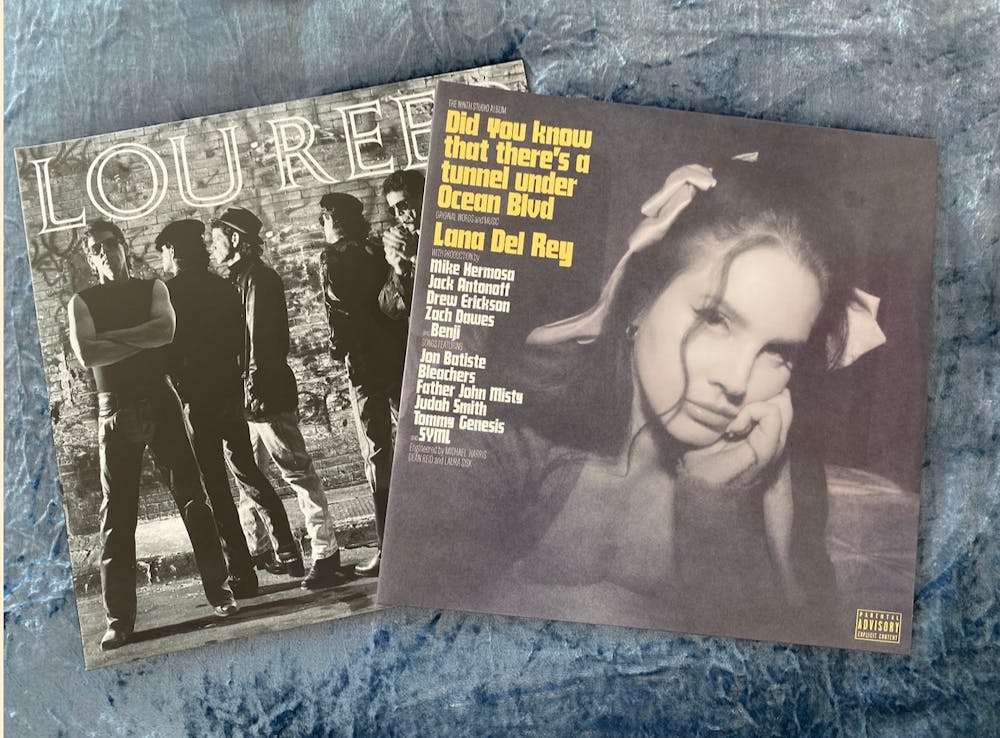
And, yes, I did end up going back to Music Millennium to get these two masterpieces.
Maria Wanzek is a reporter for The Beacon. She can be reached at wanzek22@up.edu.



